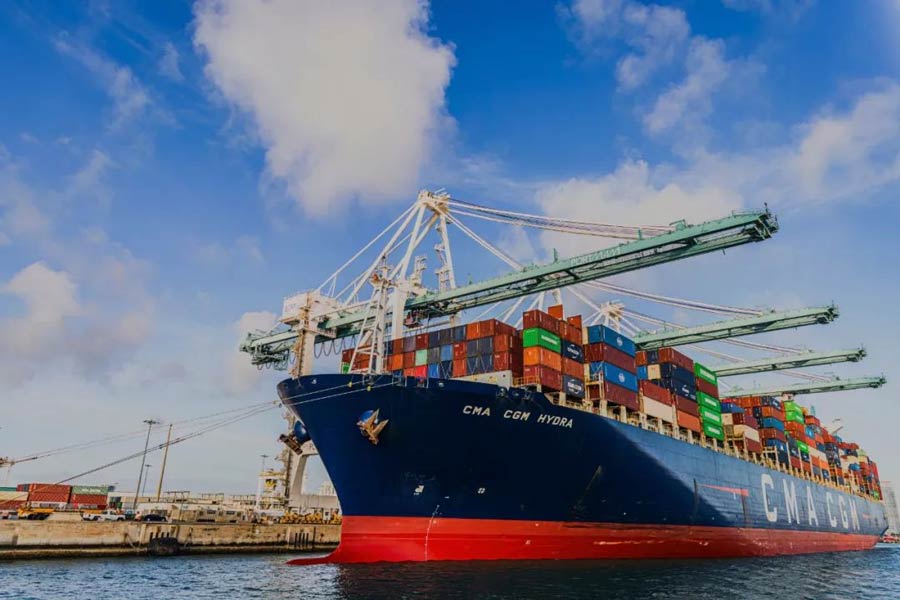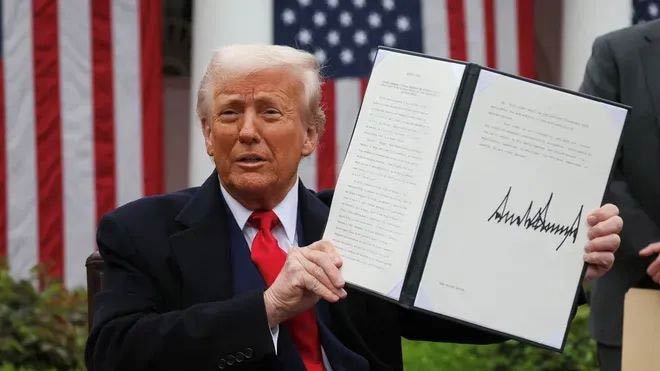

Trump's tariffs have dealt a severe blow to the container shipping market
BIMCO predicts that the latest tariffs imposed by the Trump administration are expected to hit the container shipping industry the hardest.
On April 2, US President Donald Trump announced the implementation of a 10% benchmark tariff rate for all countries, while additional tariffs will be imposed on dozens of countries with the highest US trade deficits. An additional 34 percent tariff was imposed on Chinese goods, bringing the total U.S. tariff rate on China to 54 percent.
At present, China, the European Union and several trading partners of the United States have said that they will take countermeasures in response to the US tariff policy, which is expected to further increase the cost of global trade. BIMCO expects US companies to be hit harder than companies and consumers in countries where retaliatory tariffs could be imposed.
According to Rasmussen's analysis, "Under the latest tariff policy, US import tariffs on certain goods will increase by nearly 25%." Including goods currently exempt from tariffs, the overall increase in import tariffs would be 15-20%. U.S. businesses and consumers are expected to bear the brunt as 80 percent of their import costs rise. Exporters will also inevitably be affected by a shrinking share of exports to the United States."
The tariffs could trigger double economic pressures: pushing up inflation and depressing growth. Some economists have warned that the new tariffs could push the U.S. economy into a prolonged recession, which would drag down global growth.
Rasmussen further cited OECD data: "In March this year, the OECD assessed the impact of a 10% increase in non-commodity imports from the United States and a similar 10% increase in imports from the United States by other countries. According to the OECD, such a scenario would reduce global economic output by 0.3% in the third year and boost global inflation by 0.4% annually over the first three years of the policy. Global trade volumes are forecast to contract by almost 2 per cent."
It is not yet certain how hard the US trading partners will retaliate, but the US tariff increase has significantly exceeded the OECD's previous forecast of a 10% benchmark. Rasmussen said that if countries took reciprocal retaliatory measures, the negative impact on the global economy and trade would be far greater than the OECD forecasts. He further analyzed that US consumers are likely to reduce non-essential consumption, which will hit the tourism and service industries, but the reduction of such consumer spending may prompt consumers to increase consumption of goods, thus easing the impact on the shipping industry to a certain extent.
Drury supply chain analyst Philip Damas said higher tariffs on Chinese goods could prompt countries such as the Philippines and Malaysia to prepare for the relocation of industries. Countries such as Vietnam, Thailand, Malaysia, Indonesia and the Philippines, which are already deeply integrated into global value chains, are expected to attract more investment, especially in areas such as electronics and automotive manufacturing.
"In the short term, potential disruptions in the consolidation sector could have an asymmetric impact on carriers and shippers. This has been particularly true in recent years, as the combination of events such as the coronavirus pandemic and the Suez Canal blockage, combined with continued strong demand, has resulted in exceptional profits for carriers, "he added.
Some freight forwarders reported on the 3rd that after the announcement of the tariff policy, exporters have notified the suspension of shipments, and the volume of goods is expected to be reduced by 20 to 30 percent. Several companies in Vietnam also canceled shipments.

On April 2, US President Donald Trump announced the implementation of a 10% benchmark tariff rate for all countries, while additional tariffs will be imposed on dozens of countries with the highest US trade deficits. An additional 34 percent tariff was imposed on Chinese goods, bringing the total U.S. tariff rate on China to 54 percent.
At present, China, the European Union and several trading partners of the United States have said that they will take countermeasures in response to the US tariff policy, which is expected to further increase the cost of global trade. BIMCO expects US companies to be hit harder than companies and consumers in countries where retaliatory tariffs could be imposed.
According to Rasmussen's analysis, "Under the latest tariff policy, US import tariffs on certain goods will increase by nearly 25%." Including goods currently exempt from tariffs, the overall increase in import tariffs would be 15-20%. U.S. businesses and consumers are expected to bear the brunt as 80 percent of their import costs rise. Exporters will also inevitably be affected by a shrinking share of exports to the United States."
The tariffs could trigger double economic pressures: pushing up inflation and depressing growth. Some economists have warned that the new tariffs could push the U.S. economy into a prolonged recession, which would drag down global growth.
Rasmussen further cited OECD data: "In March this year, the OECD assessed the impact of a 10% increase in non-commodity imports from the United States and a similar 10% increase in imports from the United States by other countries. According to the OECD, such a scenario would reduce global economic output by 0.3% in the third year and boost global inflation by 0.4% annually over the first three years of the policy. Global trade volumes are forecast to contract by almost 2 per cent."
It is not yet certain how hard the US trading partners will retaliate, but the US tariff increase has significantly exceeded the OECD's previous forecast of a 10% benchmark. Rasmussen said that if countries took reciprocal retaliatory measures, the negative impact on the global economy and trade would be far greater than the OECD forecasts. He further analyzed that US consumers are likely to reduce non-essential consumption, which will hit the tourism and service industries, but the reduction of such consumer spending may prompt consumers to increase consumption of goods, thus easing the impact on the shipping industry to a certain extent.

Drury supply chain analyst Philip Damas said higher tariffs on Chinese goods could prompt countries such as the Philippines and Malaysia to prepare for the relocation of industries. Countries such as Vietnam, Thailand, Malaysia, Indonesia and the Philippines, which are already deeply integrated into global value chains, are expected to attract more investment, especially in areas such as electronics and automotive manufacturing.
"In the short term, potential disruptions in the consolidation sector could have an asymmetric impact on carriers and shippers. This has been particularly true in recent years, as the combination of events such as the coronavirus pandemic and the Suez Canal blockage, combined with continued strong demand, has resulted in exceptional profits for carriers, "he added.
Some freight forwarders reported on the 3rd that after the announcement of the tariff policy, exporters have notified the suspension of shipments, and the volume of goods is expected to be reduced by 20 to 30 percent. Several companies in Vietnam also canceled shipments.





